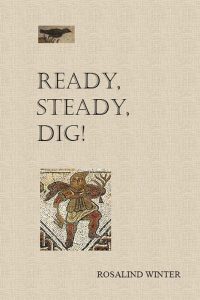24th May 2018
I’m delighted to have the opportunity this month to introduce Rosalind Winter! Rosalind is an historical author with a difference. She is adept at playing with the ‘time-slip’ concept and producing truly original stories! Read on . . .
Good Morning, Rosalind! A very warm welcome to my An Author’s Mind blog! Let’s get started straight away.

Could you briefly describe for our readers the story of Ready, Steady, Dig!?
Roman Britain in the first quarter of the fifth century AD: the legions have withdrawn to protect the Mother City of Rome. With marauding Saxons now terrorising the countryside, a wealthy Romano-Briton leaves his Cotswold villa for the safety of a nearby town, but first (as we know many did) he buries the bulk of his treasures to be retrieved when peace returns. He never comes back. Fast-forward to 1998, when the ruins of the villa come to the attention of the popular TV archaeology programme Ready, Steady, Dig! (Any resemblance to ITV’s Time Team is not in the least coincidental). The novel relates the archaeologists’ efforts to excavate the site, which are seriously hampered by the villa’s Lares and Penates, the little household gods. Sixteen hundred years ago they were ordered to guard their master’s buried treasure, and they can see absolutely no reason why they should stop now.
How would you describe the genre of this book, if any?
Comedy. Comedy is my default setting: I’m currently writing what was intended to be an entirely serious prequel to Ready, Steady, Dig! and almost from the start I have been finding irresistible (to me) comic touches. I suppose this mirrors my experience of life in general. I can generally find the funny – or at least the absurd – side of almost any situation.
Which leads me directly to … Have you compared Ready, Steady, Dig! to any other novels you’ve read? What’s the same? What’s different?
Terry Pratchett is my literary hero. I love his sense of the ridiculous, the way in which he takes situations and ideas to gloriously absurd but somehow entirely logical conclusions. A couple of years after finishing Ready, Steady, Dig! I read his Small Gods, which has a similar basic premise: what happens to the gods when there’s no one left who believes in them? I hugely admire Pratchett’s command of language, which I think is unsurpassed in comic fiction, at least in his early and middle period work. Sadly towards the end, when Alzheimers began to take hold, I find that although the ideas are still there and still as brilliant and original as ever, he often strains too much for comic effect, and sometimes fails. Finally I enjoy the way that Pratchett can move in an instant from the comic to the really rather moving: anyone who doesn’t shed a few tears towards the end of Reaper Man has no heart! This is something I aim for in my own stories, and I think this is what separates Pratchett’s work from that of other comic writers like Tom Holt: Holt is very, very funny, but I can’t remember ever really caring about any of his characters, no matter how superficially engaging they may be.
People say that all fiction is autobiographical. Have you based Ready, Steady, Dig! on a formative experience?
Chedworth Roman villa is the model for Rooks Ridge, and it’s a place I have known for as long as I can remember. One of my uncles came from Chedworth, and indeed his grandfather took part in the original excavations there. It was on a visit to Chedworth that I started to think about the beliefs of its Roman occupants. They would have been Christian, of course, by the date the villa was built, but did they entirely abandon the beliefs of ancient Rome, or were these perhaps gently relegated from formal religion to localised superstition? When Christianity was imposed by the state, would ordinary Romans really have discarded their Lares and Penates, their little household gods, and would they really have ceased to acknowledge the Genius Loci, the Spirit of Place? I think many would have continued to keep the Lares and Penates as talismans or good luck pieces, silently acknowledged even though no longer actively worshipped. I think most of us have at one time or another been aware of what I would identify as a Genius Loci: a very special feeling in a particular place, something you can’t put into words, but which raises the hairs on the back of your neck, and makes you cautious about turning around too quickly, in case you should catch a glimpse of – what? And one thinks of people today who leave flowers and teddies at the site of a fatal road accident, who set an extra place at table on the anniversary of a loved one’s death, or who toss coins into fountains and springs for good luck. Even people without any acknowledged religious belief often feel compelled to do these things; and why should the Romans have been any different? The idea of the Lares and Penates, the little household gods, particularly appealed to me. I have always been a keen student of history, but what really engages my interest is not monarchs, wars, or politics, but the intimate details of ordinary people’s lives: how they lived, what they ate and wore, and what they really believed in. What the early Romans very much believed in was a host of little supernatural beings who looked after every aspect of their households: there wasn’t just Janus, god of doorways, there was a Lar of the Hinges, a Lar of the Door Leaves, and a Lar of the Lintels. There was a Lar whose sole concern was the Broom, another for Pots and Jars, another for Platters, a pair of them for Little Dishes, and yet another for Cutlery. The list is a long one, and that’s just those we know about. I find the whole concept of the Lares and Penates really very endearing in all its domestic detail, and I simply couldn’t resist writing about them.
Who is your target readership?
I don’t have one. I write purely for my own pleasure, so the rise of self-publishing over recent years has suited me down to the ground. On the one occasion when I did have a novel accepted by a commercial publisher, I eventually reluctantly declined the offer because it was dependent on some fundamental edits that I simply could not accept. If pressed, I will say that my book is aimed at older children and adults, and something I do find mildly irritating is the occasional reviewer who says the book is “too difficult” for older children. I was reading H G Wells and Jules Verne when I was eight, and although I’m sure quite a lot of what I read then went right over my head, I don’t think that matters: if children aren’t challenged by their reading, and only read “age appropriate” books, then how are they to develop their tastes and increase their knowledge and appreciation of language?
What are your processes?
The process for me always starts with an abstract idea rather than a character. I always know how the story will begin and end, and there will be some key scenes floating around in my head which I like to get on paper as soon as possible. So I’m constantly dodging backwards and forwards, and that means I have to do a huge amount of re-writing as the book takes shape and the detailed plot develops. I don’t think this would work at all for a character-driven novel, but mine are all very much plot-driven. My characters very quickly take on lives of their own, and frequently surprise me: for example, when I started writing Ready, Steady, Dig! I had absolutely no idea that a low-key gay romance would emerge in the background. I didn’t even realise that the two characters involved were gay until about halfway through writing; then when I looked back, I found they’d been hinting at this all along. After that, what could I do but give them their own minor plot strand, and of course the strong presumption of an eventual happy outcome? I like to think that my way of building a character mirrors what generally happens in real life. When you first meet someone you know very little about them apart from their name and what they look like, and only gradually will you come to understand how they think and feel and how they are likely to behave.

What are your passions?
My passions are: social history, folklore, mythology, language, and especially names. Most of the names in my novels are indications, sometimes obvious, sometimes much less so, of significant characteristics. Several readers have spotted that although Graham appears to be a mildly comic and wholly inappropriate name for a beautiful white stag, it’s actually quite the opposite, since it derives from the Anglo-Saxon graeg hama, “grey coat.” A lot of readers have noticed a number of covert Beowulf references in my nomenclature (the reason for these becomes clearer in the prequel which I’m currently writing), although I don’t think anyone has yet identified Grendel’s descendent in Ready, Steady, Dig!, nor realised what a very nasty surprise is likely to be lurking in Harnstone Lane. My interest in nomenclature, why people, places and things are called what they are, began a very long time ago. I still remember my great satisfaction when I discovered that the apparently meaningless bird name “wheatear” has nothing to do with wheat or ears, but is in fact a bowdlerisation of the Anglo-Saxon hwit earse, and refers to the bird’s most salient characteristic, its white rump.
Is there an important theme (or themes) that the story of Ready, Steady, Dig! illustrates?
I’m afraid not! I don’t aspire to create literature: I just like writing stories.
Which character would you most like to invite to dinner this evening and why? Who would you invite too? What would you hope to learn?
The Lares and Penates – just imagine the information they could provide about everyday life in a Romano-British villa. And with such an opportunity for learning so much that now we can only guess at, it would be very unkind not to invite the splendid Mary Beard to join us!
What moments in the novel do you like best?
The Epilogue. With me, it’s almost always the Epilogue, and I tend to spend a quite disproportionate amount of time on this. It usually gets drafted very early on, and then I constantly re-visit and re-shape it as I write the rest of the novel. I like to aim for a hint of sadness in a beautiful, peaceful setting, with a final line that lifts the spirits. In Ready, Steady, Dig! it’s a lark ascending. I hope I manage to avoid sentimentality – difficult, because I have to aim very close in order to get the effect I want!
Thank you so much, Rosalind, for such an interesting and absorbing interview. Your own story reads very much like a novel too.
Rosalind Winter was born in Shillong, Assam, and educated in England, where she read English Language & Literature at Bedford College, University of London, and gained a Masters in Early English at Queen Mary College. In 1974, she received my PhD for her thesis on Beowulf and the Finsburg Fragment.
In 2006, Rosalind took early retirement, having worked in university education (University College, Cork, and Aston University), and at the Royal Shakespeare Theatre in Stratford-upon-Avon. She followed this, as Press and Education Officer for the National Trust in Cornwall, and for the Cornwall and Isles of Scilly Local Medical Committee. From 1982 to 1989 she also served in the Territorial Army with 67 (The Queen’s Own Warwickshire and Worcestershire Yeomanry) Signal Squadron (Volunteers).

Rosalind’s Bibliography!
In 2008, her first novel, the ever-popular Ready, Steady, Dig! was published, followed in 2009 by its sequel, Gnome or Mr Nice Guy. The following year I produced a book of short stories for children, The Mice of St Goran, which was published in aid of St Goran Bell Fund. I then took some time off from my own writing to edit and publish a two-volume novel written by a dear friend, the late Lesley J Nickell, Butterfly: Painted Lady (2013) and Butterfly: Mourning Cloak (2016), set in the English Civil War and based on the life of Lady Mary Villiers. In 2014/5 I encouraged my mother to mark her 99th birthday by writing her memoirs, which I have now edited and published under the title Plucking the Moon from the Bottom of the Sea: The Life and Times of Audrey Winter. The book covers her childhood in Bristol in the 1920s, wartime service in the National Auxiliary Fire Service, and life as a memsahib in Assam in the final days of the British Raj.
Rosalind also writes short stories, for both adults and children, which have appeared in a number of anthologies, and has been working intermittently on a collection of short stories set in a Cornish fishing village. At the same time,she is working on a prequel to Ready, Steady, Dig! set in Roman Britain, which it is hoped will appear in time for Christmas this year.
If you want to find out more about Rosalind and to buy Rosalind’s books, please see:
Facebook link https://www.facebook.com/rosalind.winter
Twitter link https://twitter.com/RosalindWinter
FeedARead https://www.feedaread.com/search/books.aspx?keywords=Rosalind%20Winter
21st May 2018
Coming soon – watch this space for an historical novelist with a difference! Author Rosalind Winter will be telling the tale of how she created ‘Ready, Steady, Dig!‘ – a time- slip novel that comes forward in time!
